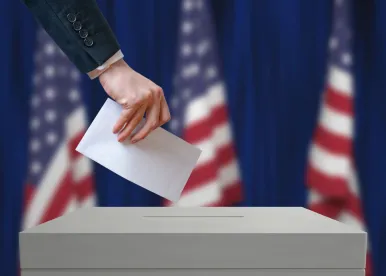New York’s 2019 legislative year was exceptional in numerous ways. The sheer volume of bills that passed both houses, especially those affecting elections and campaign finance, has not been seen in decades. In fact, the New York State Election Law underwent some of the most significant amendments in recent history. Major changes were adopted regarding registration, enrollment, ballot access, the primary election, and rules governing campaign finance. There was also the initial passage of resolutions to amend the state constitution to enable voting by mail for any or no reason, as well as same-day voter registration. This alert summarizes some of the nearly 50 most notable updates affecting New York elections in 2019.
Campaign Finance
-
LLCs Limited in Political Giving, Subject to New Disclosures: Historically, New York treated political giving by limited liability companies (LLCs) like contributions from individuals. Prior to Jan. 31, 2019, there were no aggregate limits and no disclosure obligations imposed on the contributor. Since then, however, all contributions from LLCs (including professional LLCs) have been subject to an aggregated cap, and trigger a reporting obligation by the company. No LLC may contribute more than a combined $5,000 during a calendar year to all New York state and local candidates and committees (other than housekeeping accounts). Moreover, the contribution by the LLC must be allocated to and among its members, for limitation purposes. For example, where an LLC with four equal owners opts to make a $4,000 contribution to a candidate for state assembly, the contribution will be treated as if the LLC made the contribution (thus leaving the LLC with the ability to make only another $1,000 in contributions), and the maximum amount that each member of the LLC may contribute to that same candidate will be reduced by $1,000. Finally, LLCs are now obligated to disclose information regarding its ownership structure – both to the recipient committee and to the New York State Board of Elections (NYSBOE). All recipients of LLC contributions are obligated to report, as part of their regular campaign finance filings, the names, contact information, and ownership interests for each LLC. Similarly, no later than Dec. 31 of each calendar year that it makes a political contribution, the LLC must file a “Statement of Identity” with the NYSBOE, disclosing all direct and indirect owners, with the allocable percent of ownership interest. Where an owner is an LLC, the filer must continue up the chain, until the first non-LLC owner is identified. This may prove difficult for many LLCs, particularly those that may have a long list of minor interest, limited members. It remains to be seen how the State Board will deal with those filers unable to fully identify LLC membership interests, and whether otherwise permissive contributions will need to be refunded.
-
Greater Transparency in Political Expenditures: Although independent expenditure committees were already required to identify the sponsor of all advertisements, state law did not require that other committees disclose the payer on campaign materials. Effective Jan. 1, 2020, all political communications by any New York political committee must include a disclaimer identifying the name of the committee that paid for the advertisement. Failure to do so may result in a civil penalty of up to $1,000 “or the cost of the communication, whichever is greater.”
-
Commission Creates Lower Contribution Limits and Public Matching Program: Included in the enacted 2019 final budget was language creating a nine-person Campaign Finance Reform Commission (“the Commission”). The Commission was given the task of coming up with recommendations – that would have the force and effect of law – to establish a public financing system “incentivizing candidates to solicit small contributions, reducing the pressure on candidates to spend inordinate amounts of time raising large contributions for their campaigns, and encouraging qualified candidates to run for office.” The Commission released its conclusions in December. The Legislature had the opportunity to “abrogate these recommendations by statute prior to December 22, 2019” or the report would become law. Although there is pending litigation challenging the process and the Commission’s authority, the Legislature did not take any steps to prevent the implementation of the Commission’s report. As a result, subject to any ultimate finding by the court (or possibly, amendment in a future legislative session):
-
Beginning with the 2024 election cycle,
-
contribution limits will be reduced significantly, with limits for each of the primary and the general set as follows:
-
Statewide office: $9,000 (currently $47,100 per election);
-
State Senate: $5,000 (currently $7,500 for the primary and $11,800 for the general); and
-
Assembly: $3,000 (currently $4,700 per election).
-
-
contribution limits will apply regardless of whether the candidate participates in the public financing program, and the amounts will not be adjusted for inflation, as is otherwise provided for in the Election Law.
-
There will be a voluntary publicly financed matching program, operated by the Public Campaign Finance Board (PCFB). The PCFB shall be established within the State Board of Elections, and shall have all members appointed no later than July 1, 2020. The PCFB shall be empowered to promulgate regulations to conduct the program, and shall issue any such regulations by July 1, 2021.
-
Participating candidates who qualify for the program shall be able to receive
-
a 6:1 match on contributions no greater than $250, for candidates running for statewide office, not to exceed $3.5 million for each of the primary and the general; or
-
for candidates running for Senate or Assembly, a sliding scale of matching contributions – 12:1 for the first $50 of each matchable contribution, 9:1 for the next $100, and then 8:1 for the next $100 from the same contributor, provided that a candidate for Senate shall receive no more than $375,000 in public dollars for each of the primary and the general, and a candidate for Assembly shall receive no more than $175,000 for each.
-
-
To qualify as a participating candidate for:
-
Governor, the candidate must first receive at least $500,000 in contributions from at least 5,000 matchable contributions;
-
Other statewide office, the candidate must achieve at least $100,000 in contributions from 1,000 matchable contributions;
-
Senate, $12,000 in contributions from at least 150 matchable contributions;
-
Assembly, $6,000 from at least 75 matchable contributions
-
The minimum dollar thresholds for legislative candidates seeking office in districts where there is a lower average median income (AMI) may be reduced by the PCFB
-
-
-
The following will not be matchable:
-
Contributions from any individual or entity that gives more than $250 during the cycle. Candidates will need to refund any matching funds received that are attributable to contributions from contributors who subsequently give more than $250 in the aggregate;
-
Contributions from lobbyists, vendors hired by the receiving campaign, or minors;
-
Unitemized or anonymous contributions;
-
In-kind goods or services; and
-
Transfers from party or constituted committees.
-
-
Matching funds will only be allowed to be used “by an authorized committee for expenditures to further the participating candidate’s nomination . . . or election.” Examples of ineligible expenses include:
-
costs associated with challenging other candidates’ petitions or certificates;
-
those in support of other candidates or otherwise amounts to a contribution, loan, or transfer;
-
gifts;
-
“legal fees to defend against a criminal charge”;
-
payments to a candidate or the candidate’s family member, or a business associated with any such individual;
-
payments of settlements, penalties, or fines; and
-
those associated with performing duties of public office.
-
-
All participants shall be subject to thorough audits by the PCFB within 1.5 years of the relevant election.
-
Excess public payments to a candidate will be required to be repaid to the PCFB.
-
The PCFB shall be empowered to assess civil penalties of up to $15,000 for violations of the program. The Attorney General shall have the authority, upon a referral from the PCFB, to prosecute claims of criminal violations relating to the knowing and willful filing of false statements or information to the PCFB.
-
-
Beginning with the November 2020 elections, the thresholds for achieving and maintaining political party status are adjusted. Historically, the Election Law merely required that an independent body’s candidate for governor receive at least 50,000 votes in order to become a political party, and if it met that threshold it would remain a party until such time as the party’s candidate for governor in subsequent elections failed to receive at least 50,000 votes. Now, however, in order to be considered a “party,” the organization’s candidate for governor must receive the greater of at least 2% of the total votes cast or 130,000 votes, in the year in which a governor is elected. Additionally, in a presidential year (starting with 2020), the party’s presidential candidate must receive the greater of at least 2% of the total votes cast or 130,000 votes.
-
Also beginning with the upcoming election cycle, in order for a statewide candidate to access the ballot through circulating independent nominating petitions, the candidate must collect the lesser of at least 45,000 signatures or 1% of the total number of votes cast for governor at the last election. Of that total, the candidate must collect at least the lesser of 500 signatures or 1% of the total number “of enrolled voters” coming from one-half of the congressional districts in the state.
-
-
Voting Procedures
-
Change in Primary Dates: State and non-presidential federal primary elections will be held on the same date – the fourth Tuesday in June (June 23, 2020). The upcoming presidential primary will be held on April 28, 2020.
-
NY Now Offers Early Voting: As of 2019, early voting opportunities are available to registered voters starting on the tenth day prior to a primary, general, or special election, and continuing until the Sunday before the election.
-
Increased Flexibility for Timing of Registration and Enrollment:
-
Registered voters who move within New York state but to a different county at least 20 days prior to an election no longer need to complete a new registration and enrollment; they just need to notify the County Board of Election of their new address.
-
Individuals not registered for the preceding general election may register and enroll to vote in the next primary election occurring at least 25 days after the date of such registration and enrollment. Applications postmarked or submitted to an issuing state agency by that date and received by the board of elections at least 20 days before the primary election are deemed timely.
-
Registered voters who seek to change their enrollment now can have that change take effect immediately, as long as the change is filed on or before Feb. 14, or after the seventh day following the June primary. Any changes in enrollment made between Feb. 15 and the seventh day following the June primary shall take effect on the seventh day following the June primary.
-
New York will now offer “pre-registration” for individuals aged 16 and 17. Persons who “pre-register” will automatically be registered to vote upon turning 18 years old.
-
Conclusion
This alert summarizes only a few of the key changes to the Election Law adopted during 2019. Persons interested in seeking public office, or who otherwise wish to participate in the political process by supporting candidates for office, need to be sensitive to these updates, and many other statutory changes – as well as the uncodified, unconsolidated, and unprecedented findings of the Campaign Finance Reform Commission.





 />i
/>i

